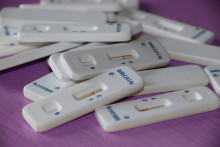The paper, co-authored by UT scientists Justine Blanford, Vera Araújo-Soares and Nienke Beerlage-de Jong, was initiated based on personal experiences. ‘In June 2021, we were all planning our summer vacation and realized we spent hours looking for Covid-19 measures in different countries,’ describes Beerlage-de Jong. ‘It was completely unclear where to find information and what information was reliable.’
‘It was like a minefield,’ adds Araújo-Soares. ‘While we just wanted to know: what is the best way to travel? How do we keep ourselves and others safe? How do we prevent infections spreading across borders?’
The three UT colleagues therefore decided to analyse all (online) publicly available information and synthesize travel entry requirements for all countries in the European Union and Schengen Area. ‘For each country we assessed their entry requirements – if you needed to test, fill in a passenger locator form or quarantine, for example,’ explains Blanford.
Information overload
‘We also assessed how accessible the information was and we found out that while there was a complete information overload on all things Covid-19, it was hard to find concrete and specific travelling information,’ says Araújo-Soares. ‘On average, we needed ten clicks to get to the right information. This also meant going through a lot of text which was difficult to read and comprehend. To expect that people find the right information and understand it was not reasonable. And if people don’t know what to do, they cannot follow the rules and will spread the disease.’
‘There was no consistency,’ says Blanford. ‘Just structuring the information we found was a huge undertaking, because there was such a variety of measures and restrictions – and how they were presented.’
The researchers gathered data during two weeks in the summer of 2021. In that time, twenty-one countries required pre-travel forms to be completed and forty apps were in use, eleven serving as digital certification checkers. ‘The EU had a good framework set up, but each country used it differently, and so it was a bit of a mess,’ adds Blanford.
Clear message
The paper’s main conclusion: the EU needs an integrated approach to travel measures – and to communicate it clearly. ‘There should be one common standard and it should be easy for people to understand,’ says Beerlage-de Jong. ‘People need to understand the narrative, otherwise they won’t adhere to the guidelines. And the information needs to be easy to find. For example, there could be one online hub, a dashboard, that guides you through everything you need for safe travels for your specific situation. Like a kind of decision support system.’
The research is not only relevant for now, but also for potential future pandemics and public health in general, stress the researchers. ‘We collected all the variations, all the different approaches across the EU. Now it is time to reflect and see what we can do better in the future,’ says Blanford.
‘We hope that our conclusions and recommendations will be taken on board,’ says Araújo-Soares. ‘We’d also like to proactively share our results, for example with the Pan-European Commission on Health and Sustainable Development. We recommend that, along with developing travel measures based on a common set of rules, a standard approach is taken to communicate what these measures are. This way we can create safety across borders.’
ut research
The paper titled ‘Navigating travel in Europe during the pandemic: from mobile apps, certificates and quarantine to traffic light system’ was published in Journal of Travel Medicine in February 2022. Its authors are University of Twente scientists Justine Blanford, professor with a focus on education (ITC Faculty), Vera Barbosa Araújo Soares Sniehotta, Professor of Health Psychology and Planetary Health (BMS Faculty) and Nienke Beerlage-de Jong, Assistant Professor of eHealth technology for One Health (BMS Faculty), Stephanie Schouten and professor Alex Friedrich (Universitätsklinikum Münster).









